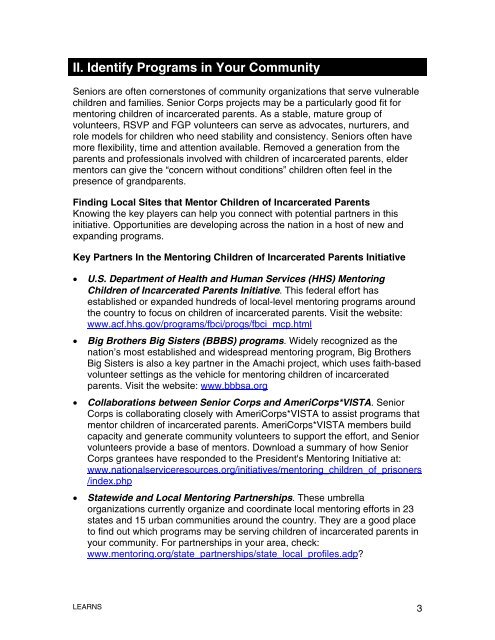Children of Incarcerated Parents
Children of Incarcerated Parents
Children of Incarcerated Parents
Create successful ePaper yourself
Turn your PDF publications into a flip-book with our unique Google optimized e-Paper software.
II. Identify Programs in Your Community<br />
Seniors are <strong>of</strong>ten cornerstones <strong>of</strong> community organizations that serve vulnerable<br />
children and families. Senior Corps projects may be a particularly good fit for<br />
mentoring children <strong>of</strong> incarcerated parents. As a stable, mature group <strong>of</strong><br />
volunteers, RSVP and FGP volunteers can serve as advocates, nurturers, and<br />
role models for children who need stability and consistency. Seniors <strong>of</strong>ten have<br />
more flexibility, time and attention available. Removed a generation from the<br />
parents and pr<strong>of</strong>essionals involved with children <strong>of</strong> incarcerated parents, elder<br />
mentors can give the “concern without conditions” children <strong>of</strong>ten feel in the<br />
presence <strong>of</strong> grandparents.<br />
Finding Local Sites that Mentor <strong>Children</strong> <strong>of</strong> <strong>Incarcerated</strong> <strong>Parents</strong><br />
Knowing the key players can help you connect with potential partners in this<br />
initiative. Opportunities are developing across the nation in a host <strong>of</strong> new and<br />
expanding programs.<br />
Key Partners In the Mentoring <strong>Children</strong> <strong>of</strong> <strong>Incarcerated</strong> <strong>Parents</strong> Initiative<br />
• U.S. Department <strong>of</strong> Health and Human Services (HHS) Mentoring<br />
<strong>Children</strong> <strong>of</strong> <strong>Incarcerated</strong> <strong>Parents</strong> Initiative. This federal effort has<br />
established or expanded hundreds <strong>of</strong> local-level mentoring programs around<br />
the country to focus on children <strong>of</strong> incarcerated parents. Visit the website:<br />
www.acf.hhs.gov/programs/fbci/progs/fbci_mcp.html<br />
• Big Brothers Big Sisters (BBBS) programs. Widely recognized as the<br />
nation’s most established and widespread mentoring program, Big Brothers<br />
Big Sisters is also a key partner in the Amachi project, which uses faith-based<br />
volunteer settings as the vehicle for mentoring children <strong>of</strong> incarcerated<br />
parents. Visit the website: www.bbbsa.org<br />
• Collaborations between Senior Corps and AmeriCorps*VISTA. Senior<br />
Corps is collaborating closely with AmeriCorps*VISTA to assist programs that<br />
mentor children <strong>of</strong> incarcerated parents. AmeriCorps*VISTA members build<br />
capacity and generate community volunteers to support the effort, and Senior<br />
volunteers provide a base <strong>of</strong> mentors. Download a summary <strong>of</strong> how Senior<br />
Corps grantees have responded to the President's Mentoring Initiative at:<br />
www.nationalserviceresources.org/initiatives/mentoring_children_<strong>of</strong>_prisoners<br />
/index.php<br />
• Statewide and Local Mentoring Partnerships. These umbrella<br />
organizations currently organize and coordinate local mentoring efforts in 23<br />
states and 15 urban communities around the country. They are a good place<br />
to find out which programs may be serving children <strong>of</strong> incarcerated parents in<br />
your community. For partnerships in your area, check:<br />
www.mentoring.org/state_partnerships/state_local_pr<strong>of</strong>iles.adp?<br />
LEARNS 3

















